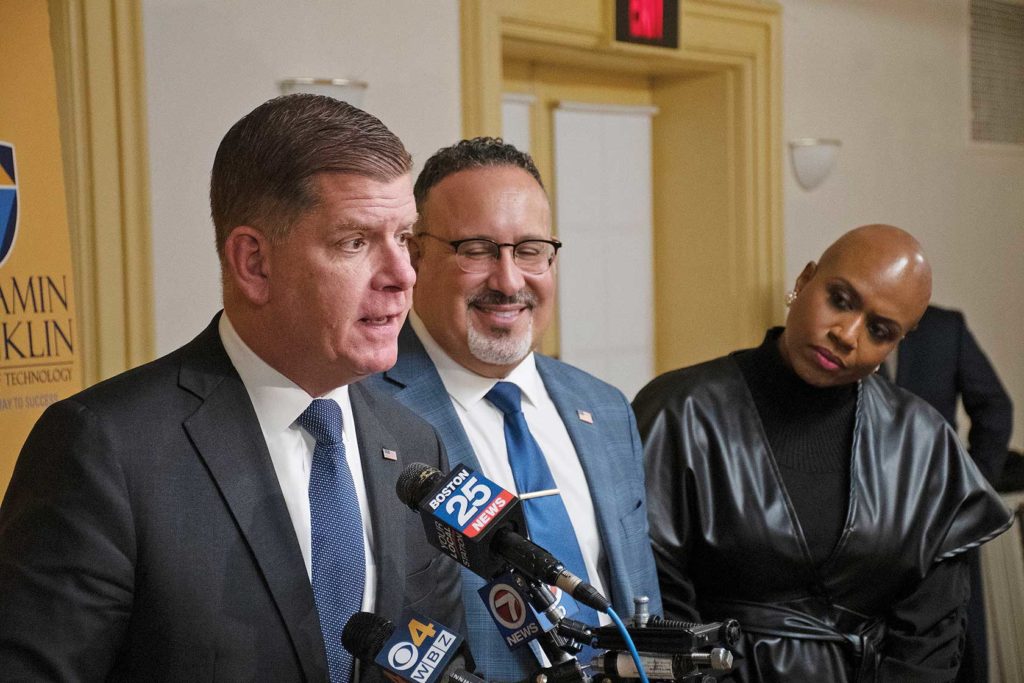Walsh, Cardona pay visit to Franklin Institute
Cite school as model for higher education

U.S. Secretary of Labor Marty Walsh and Secretary of Education Miguel Cardona visited Benjamin Franklin Cummings Institute of Technology (BFIT) Friday to celebrate the school’s model of teaching, which focuses on partnering and collaborating with other educational institutions.
During a moderated conversation at the event with BFIT President Aisha Francis, Walsh and Cardona praised the school’s efforts and educational model, aimed to connect students to employers. They also described the program’s connections to efforts the Biden administration is pushing nationally, especially focused on equitable access to education and climate resilience.
Cardona said schools like BFIT represent the Biden administration’s national aims by focusing on partnerships outside of the school.

(l-r) Aisha Francis, president of Benjamin Franklin Cummings Institute of Technology, and Secretary of Education Miguel Cardona listen as Secretary of Labor Marty Walsh discusses pairing education and employment in secondary and higher education. PHOTO: AVERY BLEICHFELD
“Schools that are going to thrive, that are going to succeed, are schools that are doing what you’re doing: intentional collaboration with high schools, intentional collaboration with four-year schools, intentional collaboration with workforce partners — and I saw that today,” Cardona said.
Walsh said that work is especially important when it comes to engaging communities of color. BFIT reports that 74% of its students are students of color and 57% are first-generation college students.
“If you follow them home, the areas that they live in, there’s not many opportunities for them to go down the street and jump into a corporation because the corporations aren’t there,” Walsh said. “What we have to do is be really focused and intentional about partnering with [BFIT], partnering with community colleges all across the country, partnering with employers across the country.”
They also focused on the need for innovation in jobs and education, as technology develops and the need for greener infrastructure production increases.
From a labor perspective, Walsh said the efforts are both on training workers in emerging industries and on retraining workers now in fossil fuel jobs.
“The tricky part about the clean energy space is that there are some careers that are just starting up, so we have to try and get in early, but we’re also looking at the transitional energy spaces, where coal miners are coal miners today, and they’re going to be transitioning, where refiners are refiners today, they’re going to change,” Walsh said. “So, we’re working on also creating a pathway for transition for workers that are in these fields now, so they don’t have to quit there. They can be reskilled and retrained and brought up to speed pretty quickly. But we’re working on both of those phases.”
Francis said that it is especially important to do that work in the local community.
“We know that 90% of our students are going to stay right here,” Francis said. “They’re from here, they’re going to stay here, and we just want a lot more students and a lot more attention on the fact that tech and trade education is absolutely connected to sustainability and to green jobs.”
Walsh also highlighted BFIT’s Early College Program, which connects high school students with opportunities to take college classes or get a head start on a degree through BFIT, citing those sorts of connections as one of several priorities for investing in the country’s education system.
Cardona noted that programs like the one at BFIT that connects high school students with college opportunities are also important to open doors to a more diverse student population.
“For so many students, they look at college as too far away, ‘I can’t do that.’ For the first-generation college students, like I was, if you don’t have those experiences, you might not see in yourself the ability to be successful there. So when I say we need to evolve our high schools, every high school in this country needs to have an early college experience program to give our students an opportunity to see what they can be, even when they don’t dream that high.”
That sense of wide-reaching opportunity is common at BFIT, Francis said.
“It’s not where you start, but it’s where you go,” she said. “We always say, ‘Start here, go anywhere.’”
Both secretaries cited diversity as a priority for students and teachers, especially in STEM education.
“We’ve got to change what STEM looks like; there are not enough Black and brown students in STEM, there are not enough girls in STEM. We’ve got to change that,” Cardona said. “We’re hitting that head-on, and we want to make sure that we also look at diversifying the teachers in STEM, right? Looking at our partners that are in the field that want to go into teaching and saying, ‘Look, you have an engineering degree, have you ever considered becoming a teacher?’”
Walsh said this is especially important with concerns across the country about a worker shortage.
“As a country, if we don’t get on the ball and really change the way we think of STEM and teach STEM, and don’t get more people interested in it — kids of color, African American, Latino, women — we think we have a worker shortage now in this country? We’re going to have a huge worker shortage,” Walsh said.
Walsh said that event attendees were “sitting in the model” to tackle all those challenges nationwide. Cardona, too, said he thinks BFIT is doing it right.
“I know when I leave here, I’m going to think about this school and think about, ‘How can we get models like this across the country?’” Cardona said.






